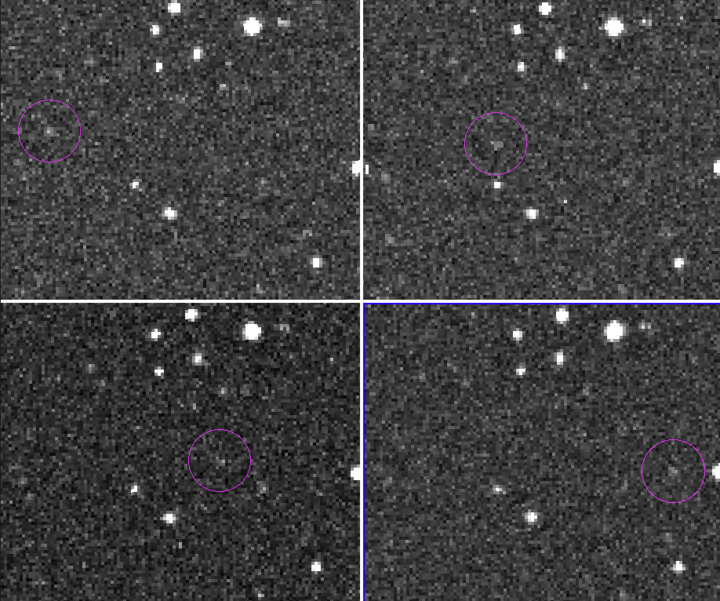Asteroid detected heading for Earth burns up in ‘spectacular fireball’ before impact
This is just the ninth asteroid that humankind has ever spotted before impact, ESA says
Your support helps us to tell the story
From reproductive rights to climate change to Big Tech, The Independent is on the ground when the story is developing. Whether it's investigating the financials of Elon Musk's pro-Trump PAC or producing our latest documentary, 'The A Word', which shines a light on the American women fighting for reproductive rights, we know how important it is to parse out the facts from the messaging.
At such a critical moment in US history, we need reporters on the ground. Your donation allows us to keep sending journalists to speak to both sides of the story.
The Independent is trusted by Americans across the entire political spectrum. And unlike many other quality news outlets, we choose not to lock Americans out of our reporting and analysis with paywalls. We believe quality journalism should be available to everyone, paid for by those who can afford it.
Your support makes all the difference.A tiny asteroid headed for the Earth has burned up in a “spectacular fireball” over the Philippines, the European Space Agency (ESA) said.
The space rock, measuring only about a metre (3ft) in size, had eluded discovery and was spotted by research technologist Jacqueline Fazekas at Arizona’s Catalina Sky Survey only on Wednesday morning.
Labelled as 2024 RW1, the asteroid was predicted to burn up in the atmosphere, posing no risk to people on the ground.
Several agencies and amateur space observers, including Nasa’s Planetary Defense coordination office, confirmed that the harmless asteroid burned up over the Philippines around midnight local time (4.40pm UTC Wednesday).
A few pictures and videos of 2024 WR1 ☄️, while waiting for more physical properies of the small near Earth asteroid and associated fireball...https://t.co/1Yycwvd8b4 pic.twitter.com/fCXeIhDjo4
— IMO Meteor Org. (@IMOmeteors) September 4, 2024
Such small sized asteroids strike Earth frequently but are rarely noticed before impact.
“Nearby tropical storm Yagi/Enteng will make fireball observations difficult,” ESA had said.
But clearer weather ensured people near the Luzon Island in the Philippines could spot the burning space rock, with many sharing photos and videos of the spectacular event on social media.
“This is just the ninth asteroid that humankind has ever spotted before impact,” the ESA posted on X. Planetary defence systems to detect and track near-Earth asteroids posing potential risk to the planet have become a priority in recent times.
☄️💥Woah! Newly discovered 1-1.5m asteroid 2024 RW1 (spotted by near-Earth asteroid hunters in the US) burns up above the Philippines just hours after it was first seen.
— Dr Robin George Andrews 🌋☄️ (@SquigglyVolcano) September 4, 2024
This asteroid wasn’t a risk. But if it was, a duck-and-cover warning was possible. pic.twitter.com/Fht4yqRsBP
Space agencies, including Nasa, are testing methods to tackle such life-threatening asteroids.
Nasa’s 2022 Dart mission crashed a rocket travelling at about 6.6kmps into the football stadium-sized asteroid Dimorphous to test the feasibility of deflecting such space rocks from their future Earth-bound trajectories.
China is also planning a mission to deflect an asteroid by 2030.
While large space rocks on trajectory towards Earth pose a serious threat to the planet, even smaller ones that elude detection can cause significant damage to life and property.

Over a decade ago, a 20m-meteor travelling at over 18kmps exploded over Russia’s Chelyabinsk city, causing a massive explosion with the energy of more than 30 atomic bombs.
The meteor’s airburst injured more than 1,500 people from shattered glass, leaving buildings damaged.
While scientists worldwide work to catalogue all asteroids over 1km in size, there is a chance a smaller one may slip through the net once in a while.
Nasa is planning to launch a new infrared telescope called the NEO Surveyor to look for such space rocks near Earth.
Join our commenting forum
Join thought-provoking conversations, follow other Independent readers and see their replies
0Comments